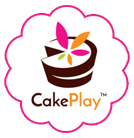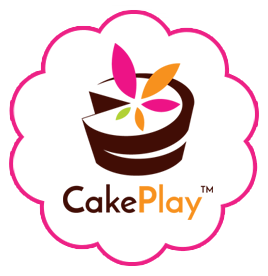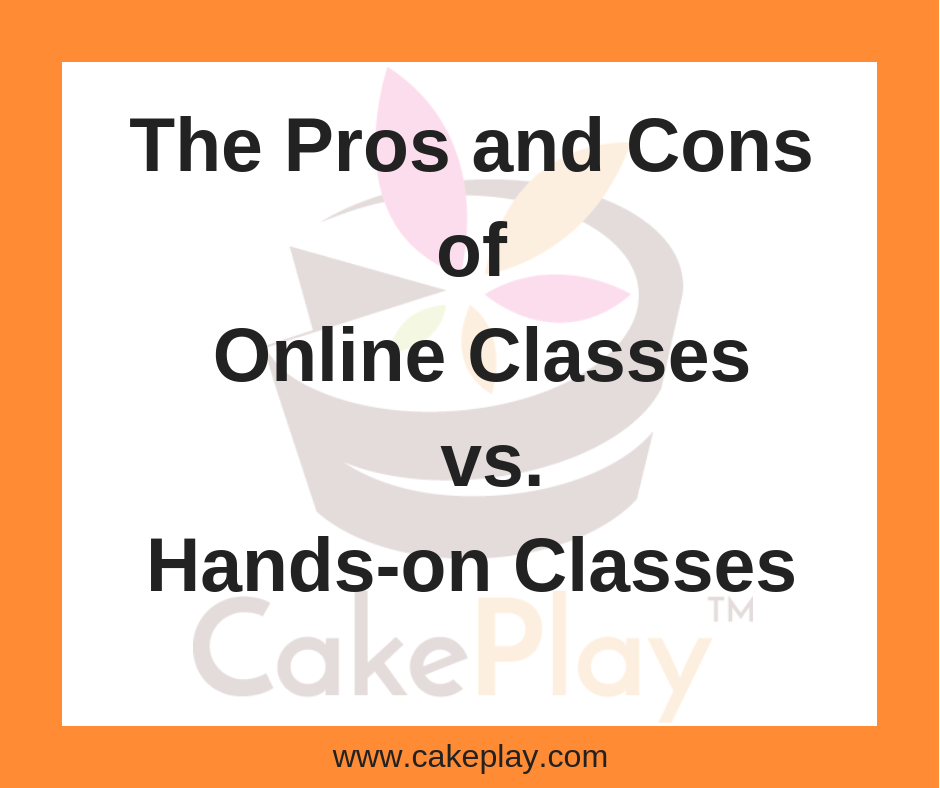The Pros and Cons of Online Classes vs. Hands-on Classes
- Anna Weisend
- 13 Feb 2019
[Full Disclosure: While a lot of effort has gone into keeping this post fair and balanced and fact-based, we felt that it was important to disclose that both Peggy Tucker, the owner of CakePlay, and Anna Weisend, the author, are both hands-on instructors.]
What have you done for me lately?
Most sugar artists, pastry chefs, and teachers would agree that continuing education is an important ingredient in their careers. You will quickly become a dinosaur if you do not keep up with current trends, techniques, and industry developments. Just like every other professional industry, you are only as good as your last achievement. In other words, “What have you done for me lately?”
How you go about getting that education will depend on where you are at in your career and what you need to go forward. If you are working with a professional organization or an accredited educational institution, you may need official certificates or degrees. If you are self-employed, you set the standard for your own education. Maybe you’ve already accumulated the certificates and degrees and just need to stay on top of new techniques and skills.
There are several ways of accumulating new skills, such as apprenticing, tinkering, and reading books, but the two main ways of taking classes are either live hands-on classes or online classes (for the purposes of this article, YouTube and similar video sources are considered online classes). Both have benefits and detriments.
Online Classes
Pros
- Often less expensive (or free), than hands-on classes.
- You can take them on your own time.
- You don’t have to leave home.
- You never have to deal with other students you don’t like.
- You can work at your own pace.
- Geography is not an issue.
- Are available to a wider group of people.
Cons
- Accredited Classes are just as expensive as or more expensive than locally accredited classes.
- You do not get real-time feedback.
- It may be harder to discern an individual who put up a YouTube video because they could vs. an experienced instructor. This can lead to misinformation.
- You need to provide all your own tools and supplies.
- There is no personal relationship with the instructor.
Hands-on Classes:
Pros:
- You get immediate feedback.
- Instructors can point out when you are using the wrong form.
- Instructors can clarify if you did not fully understand instructions.
- You can glean more information from the instructor via discussion
- Classes can be more personalized based on an immediate assessment of the instructor.
- Most hands-on classes supply tools and materials, allowing you to try a technique before you invest in it.
- Instructors are usually vetted by the hosting organization, ensuring knowledgeable instructors.
- You can build a report with the instructor.
Cons:
- They tend to cost more than online classes.
- Geography can be a problem by requiring more time and multiplying the cost with travel, lodging, and meal expenses
- They are not as available or accessible to everyone as an online class.
- You have to deal with other personalities in the class.
Which to choose?
Clearly, each type of class has more pros than cons. Learning is always a win. However, how do you personally make a decision on which type of class would be of the most benefit to you? Some of it is obvious- time, cost analysis, and geography being the no-brainers. There are other things you can consider. Weigh your options before deciding.
- Is this something you want to try before you commit to investing in all the tools because you are not sure you even enjoy it?
- Do you want to network with others in the industry?
- What ability level are you currently at?
- Do you just need a refresher?
- What is your best learning style?
- What environment is more conducive for your personal learning style?
- Are you only looking for additional tips and tricks?
- Is there a professional hero you have always admired and want to meet?
Additional Tips
Here are some additional tips that might be helpful.
- If you enjoy hands-on classes, saving up to visit a convention and taking multiple classes can leverage your extra costs, making it more affordable in the long run.
- When taking an online class, try to investigate the credentials of the instructor beforehand.
- Did you know that if you take a class at an ICES (International Cake Exploration Societe) convention, you can receive a continuing education certificate from the ACF (American Culinary Federation)?
- You should never expect perfection coming out of a class. A class is just a starting point, it takes practice to develop skills.
- When taking an unaccredited class you may receive a certificate of completion. This in no way speaks to proficiency.
- Whether hands-on or online, taking classes from someone whose work you admire is always a great place to start.




